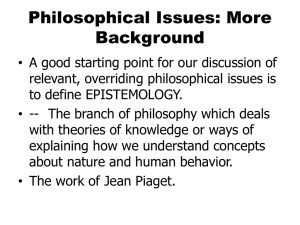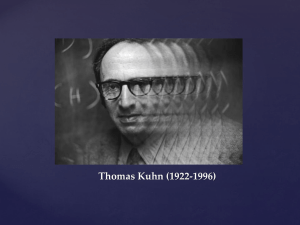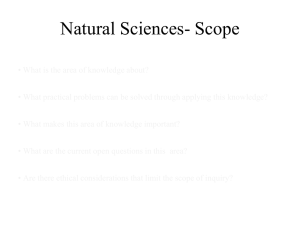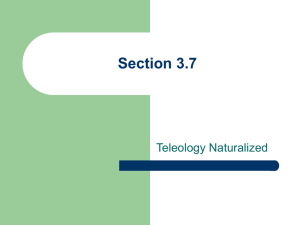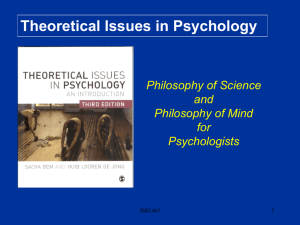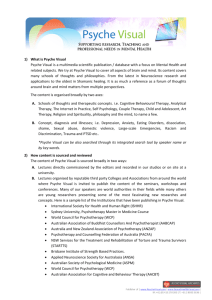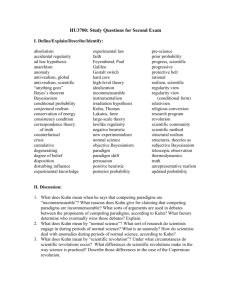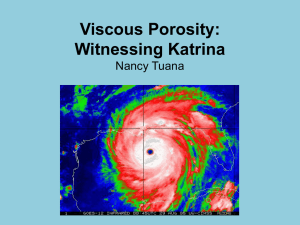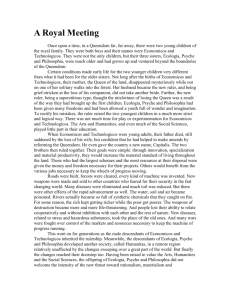Chapter 2 Philosophical Issues
advertisement
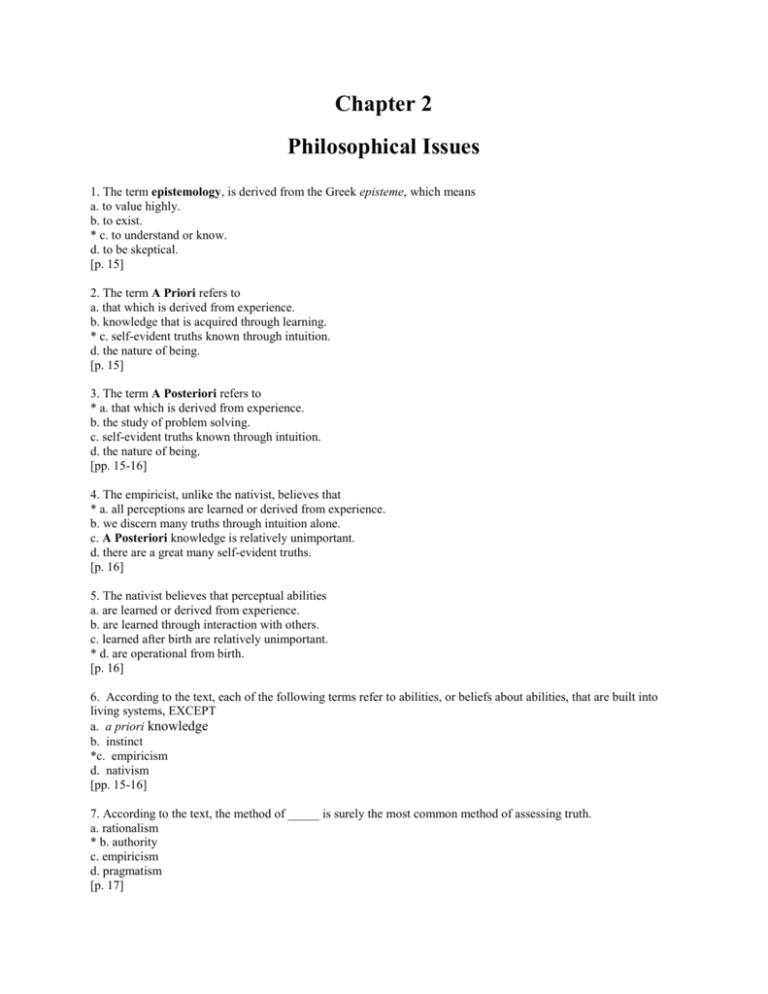
Chapter 2 Philosophical Issues 1. The term epistemology, is derived from the Greek episteme, which means a. to value highly. b. to exist. * c. to understand or know. d. to be skeptical. [p. 15] 2. The term A Priori refers to a. that which is derived from experience. b. knowledge that is acquired through learning. * c. self-evident truths known through intuition. d. the nature of being. [p. 15] 3. The term A Posteriori refers to * a. that which is derived from experience. b. the study of problem solving. c. self-evident truths known through intuition. d. the nature of being. [pp. 15-16] 4. The empiricist, unlike the nativist, believes that * a. all perceptions are learned or derived from experience. b. we discern many truths through intuition alone. c. A Posteriori knowledge is relatively unimportant. d. there are a great many self-evident truths. [p. 16] 5. The nativist believes that perceptual abilities a. are learned or derived from experience. b. are learned through interaction with others. c. learned after birth are relatively unimportant. * d. are operational from birth. [p. 16] 6. According to the text, each of the following terms refer to abilities, or beliefs about abilities, that are built into living systems, EXCEPT a. a priori knowledge b. instinct *c. empiricism d. nativism [pp. 15-16] 7. According to the text, the method of _____ is surely the most common method of assessing truth. a. rationalism * b. authority c. empiricism d. pragmatism [p. 17] 8. Knowledge, according to empiricism, is based on facts presented through * a. observation and experience. b. intuition. c. instinct. d. authority. [p. 18] 9. The term rationalism comes from the same Latin root as a. logic. b. intuition. * c. reason. d. mathematics. [p. 18] 10. Aestheticism emphasizes a. an active mind. b. dependence on sensory experience. * c. the belief that the principles of beauty are applicable to other arenas of thought. d. the cash value of an idea. [p. 18] 11. Pragmatism emphasizes the _____ of an idea. a. absolute truth. b. intuitive success c. importance of authoritarian validation * d. cash value or workability. [pp. 18-19] 12. Strong emotions are more likely to be conditioned to ____________ as a way of knowing. * a. authority. b. pragmatism. c. empiricism. d. rationalism. [p. 19] 13. Observational evidence alone does not warrant a universal conclusion. Thus, though every observed swan is white, there is no basis for saying that all swans are white. Such a contention is found in the work of an important philosopher of science by the name of _____. a. Thomas S. Kuhn b. Paul Feyerabend * c. Karl Popper d. William James [p. 20] 14. According to Popper, a theory should a. survive over time. * b. be falsifiable. c. have intuitive appeal. d. meet an aesthetic criterion. [p. 21] 15. The term paradigm as used by _____ refers to _____. a. Popper . . . anarchy in science * b. Kuhn . . . conventional ways of solving problems c. Feyerabend . . . normal science d. Descartes . . . the hypothetico-deductive method [p. 22] 16. According to Kuhn, a shift in scientific view marked by a radical new and more successful organization of the world is a. normal science. b. a paradigm. * c. a scientific revolution. d. all of the above. [p. 23] 17. Which of the following has argued for an anarchistic epistemology marked by the belief that there is no such thing as a single unified and unchanging scientific method? * a. Paul K. Feyerabend b. Thomas Kuhn c. Karl Popper d. Francis Bacon [pp. 23-24] 18. Domino A impacts domino B and B falls over. According to Aristotle, domino A is the ____ cause of the fall of B. a. formal * b. efficient c. final d. material [p. 25] 19. An airplane could be constructed of appropriate materials and have an adequate propulsion system, but if the wing or some other part were not shaped appropriately, the plane would not fly. The importance of the shape of the plane is close in meaning to Aristotle's ___ cause. a. material b. final c. teleological * d. formal [p. 25] 20. The final cause, according to Aristotle, refers to a. that which immediately sets a thing in motion b. the shape or identifying features of an object of interest * c. the purpose or end for which a thing was intended d. free will [p. 25] 21. The term teleology refers to a. the formal cause * b. purpose or design c. the energy that sets a causal chain in motion d. the technical study of religion [p. 25] 22. The view that any design in nature is immanent in nature is found in _____ , whereas the view that any design in nature is the work of a designer is found in _____. * a. intrinsic teleology . . . extrinsic teleology b. extrinsic teleology . . . intrinsic teleology c. intrinsic teleology . . . formal cause d. extrinsic teleology . . . formal cause [p. 26] 23. Psychological determinism is the belief that * a. there are causes, known or unknown, for every behavior or experience. b. some events may really be random. c. humans freely determine their own choices. d. all of the above. [p. 27] 24. The contemporary status of the free will – determinism debate in psychology is best characterized as a. abandoned due to its irrelevance to the discipline *b. focused on physiological determinants of intentions c. resolved in favor of determinism due to recent advances in technology and neuroimaging tools d. resolved in favor of free will due to recent advances in technology and neuroimaging tools [p. 28] 25. The term ontology refers to a. the study of the limitations of human knowledge b. the study of values * c. the study of the nature and relations of being d. the study of causality [pp. 28-29] 26. Materialism is the belief that a. mind is the primary material of the universe. * b. matter makes up everything. c. mind interacts with material. d. all of the above. [p. 29] 27. According to idealism a. material reality is the basis of all science b. language is the basis of all science * c. the mental world or the world of experience is the basis of all science d. science studies only the physical world [p. 29] 28. Mind is a kind of overflow of by-product of brain activity, but mind has no causal efficacy. Such a contention is most consistent with a. interactionism b. epistemology c. ontological pluralism * d. epiphenomenalism [p. 30] 29. According to the text, the commonsense position with respect to mind and body is known as * a. interactionism b. psychophysical parallelism c. emergentism d. epiphenomenalism [p. 30] 30. One of the more difficult problems associated with psychophysical parallelism is that a. it fails to specify a source of interaction between mind and body * b. it implies a kind of preestablished harmony c. it fails to show how mind emerges from body d. it agrees in an uncanny way with common sense [p. 31] 31. Some philosophers have argued that mental processes are produced by brain processes, but are nevertheless qualitatively different from brain processes. Such a position is called * a. emergentism b. interactionism c. psychophysical parallelism d. attributive pluralism [p. 31] 32. The idea that there are many separate real things (e.g., a real mind, a real body, a real God, a real material world, and so on) is most consistent with a. attributive pluralism * b. ontological pluralism c. epiphenomenalism d. interactionism [p. 31] 33. Psychogeny can be defined as the study of * a. the origin of psyche. b. materialist mind-brain positions. c. double-aspect monism. d. the origin of the mind-brain debate [p. 32] 34. Psychogenic identity theory maintains that a. psyche is instilled in the biological substrate at a given point in time. b. the psychically endowed biological substrate is identical with the conscious adult. c. the psyche does not change qualitatively across the lifetime of the individual. * d. all of the above. [p. 32] 35. Psychogenic emergentism is the belief that a. psyche is instilled in the organism at one point in time. * b. psyche develops with the developing biological organism. c. the instilled psyche is identical with the conscious adult. d. all of the above. [p. 33] 36. A central problem with explanations by comparison is * a. the risk of overgeneralization. b. that humans lack confidence in analogies. c. that differences between ideas or concepts may be overemphasized. d. all of the above. [p. 35]
